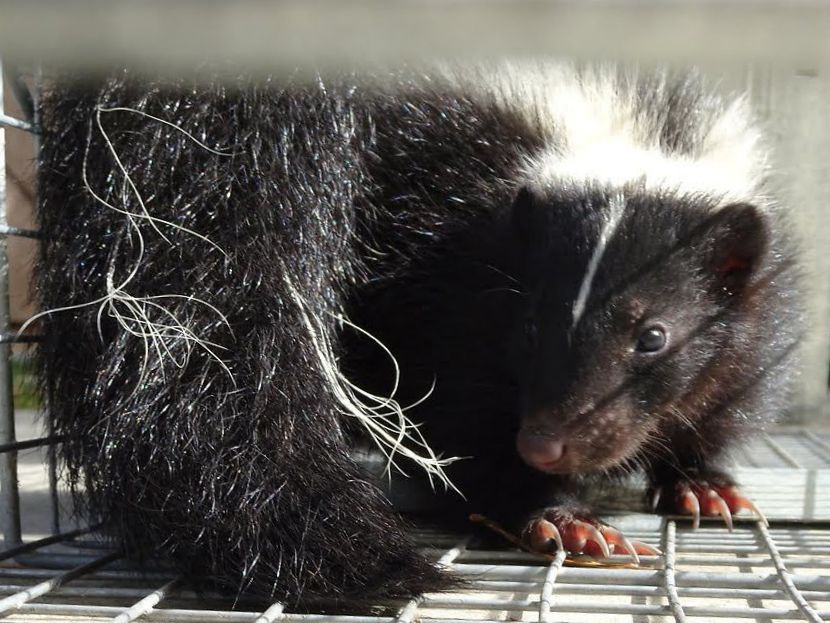
When you see a baby wild animal, struggling, all alone in the world, it is a very common instinct to want to get involved — to want to help save that youngster in some way. Baby animals are 100% more adorable than their adult counterparts, and walking away from something so tiny and defenseless seems like an all-too impossible task.
Sadly, that's usually the very best thing you can do for a lone youngster found in the wild, and even more so when you're dealing with baby skunks, also known as kits. There are three incredibly huge reasons why keeping your distance from a baby skunk is the best thing you can do to help the animal …
1 – Orphaned skunk kits are often not actually orphaned.
There are three main reasons why a skunk kit might be orphaned. Firstly, the mother has been trapped and killed or released elsewhere. Secondly, the mother has been hit by a car. Thirdly, the mother has been taken down by a predator, or starvation/dehydration/natural causes (such as disease).
There are plenty more reasons why a skunk kit might NOT be orphaned, however. Mothers of all wild animal species move their youngsters around from den site to den site, in most cases, to get away from danger. If a predator is hanging around the current den site, she won't leave her youngsters there so that she can forage for food; they might come under attack. A skunk kit makes a very tasty and easy snack for an animal that's about the same size as a raccoon, opossum, fox, etc.
If a female skunk has more than one kit to take care of, she might need to move them one-by-one, and attempting to remove multiple youngsters at once could result in one simply falling off. If that is the case, the mother will search and rescue the fallen-off young.
She could also have found herself ambushed by a predator or human along her movements, stashing her youngsters somewhere safe and fending off the threat. Again, if that is the case, the mother will come back and rescue her young.
Sometimes, just sometimes, the young skunk kit will have gotten a bit braver than it should have done, perhaps leaving the den to hunt or explore. This is rare, but skunk kits can sometimes leave of their awn accord. They intend to go back, they just can't work out how. They are too young to have the skills they need to leave, hunt for food, and then go back home again.
In all of these cases, mama will come to the rescue. If you move that young skunk, the mother wont' have a chance to go back for it. You will likely kill the kit by accident.
2 – You can't save the animal (in most cases).
Very young skunks won't survive without their mothers no matter how much you try to keep them alive. If they are still very young, barely even managing to get around, they probably aren't even weaned yet, and you can't just feed them cow's milk and hope they'll survive. They need a rather specific diet — one that you won't have access to.
If the youngster has been abandoned for some reasons, either for injury or illness, veterinary treatment could be necessary to keep it alive, and this will come at your expense. You will assume the responsibility for that animal. Most vets won't deal with a "pet" skunk (which is essentially what yours will be once you adopt it from the ‘wild') because of the risk of rabies, plus the threat of being sprayed. Even young skunks can spray. (They're just not that great at aiming yet.)
3 – You don't have the knowledge, experience or resources necessary to try and save a baby skunk.
The internet can only help so far when you're talking about wild animals, and when researching "how to help a baby skunk", you may not come across all the information you'll need. For example, are you aware that skunks, even baby skunks, come with a high rabies risk? An animal doesn't need to physically look rabid in order to have the rabies virus, and they don't always need to bite you in order to pass it along.
Without extensive knowledge of the animal you're trying to save, there's a very high chance that you will do more damage to it. IF you are unaware that the animal is sick or injured, for example, attempting to save it in your home might just cruelly extend its life further, and the pain it'll suffer along the way. When mothers abandon their young, there's usually a very good reason. In some cases, it'll be because the mother is instinctively aware of a sickness or disease, and therefore chooses to focus all of her time and attention on the youngsters that ARE fit and healthy. Trying to keep an animal that is inevitably going to die alive is a waste of resources. It really is a dog-eat-dog world out there … Or skunk-eat-skunk.
If you come across a lone skunk kit, seemingly orphaned, you should leave it alone. Getting too close with the mother close by, watching to see what you do, could result in a spray incident, or actual, physical contact. This, again, comes with a rabies risk.
Go back to the pestcontrolskunk.com home page.
Copyright 2021 - pestcontrolskunk.com
Nationwide Skunk Trapping & Removal